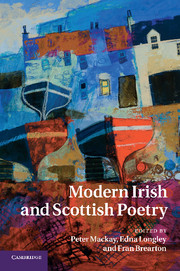Book contents
- Frontmatter
- Contents
- List of contributors
- Acknowledgements
- Introduction
- 1 Swordsmen: W. B. Yeats and Hugh MacDiarmid
- 2 Tradition and the individual editor: Professor Grierson, modernism and national poetics
- 3 Louis MacNeice among the islands
- 4 Townland, desert, cave: Irish and Scottish Second World War poetry
- 5 Affinities in time and space: reading the Gaelic poetry of Ireland and Scotland
- 6 Contemporary affinities
- 7 The Classics in modern Scottish and Irish poetry
- 8 Translating Beowulf: Edwin Morgan and Seamus Heaney
- 9 Reading in the gutters
- 10 ‘What matters is the yeast’: ‘foreignising’ Gaelic poetry
- 11 Outside English: Irish and Scottish poets in the East
- 12 Names for nameless things: the poetics of place names
- 13 Desire lines: mapping the city in contemporary Belfast and Glasgow poetry
- 14 ‘The ugly burds without wings’?: reactions to tradition since the 1960s
- 15 ‘And cannot say / and cannot say’: Richard Price, Randolph Healy and the dialogue of the deaf
- 16 On ‘The Friendship of Young Poets’: Douglas Dunn, Michael Longley and Derek Mahon
- 17 ‘No misprints in this work’: the poetic ‘translations’ of Medbh McGuckian and Frank Kuppner
- 18 Phoenix or dead crow? Irish and Scottish poetry magazines, 1945–2000
- 19 Outwith the Pale: Irish–Scottish studies as an act of translation
- Guide to further reading
- Index
- References
18 - Phoenix or dead crow? Irish and Scottish poetry magazines, 1945–2000
Published online by Cambridge University Press: 18 April 2011
- Frontmatter
- Contents
- List of contributors
- Acknowledgements
- Introduction
- 1 Swordsmen: W. B. Yeats and Hugh MacDiarmid
- 2 Tradition and the individual editor: Professor Grierson, modernism and national poetics
- 3 Louis MacNeice among the islands
- 4 Townland, desert, cave: Irish and Scottish Second World War poetry
- 5 Affinities in time and space: reading the Gaelic poetry of Ireland and Scotland
- 6 Contemporary affinities
- 7 The Classics in modern Scottish and Irish poetry
- 8 Translating Beowulf: Edwin Morgan and Seamus Heaney
- 9 Reading in the gutters
- 10 ‘What matters is the yeast’: ‘foreignising’ Gaelic poetry
- 11 Outside English: Irish and Scottish poets in the East
- 12 Names for nameless things: the poetics of place names
- 13 Desire lines: mapping the city in contemporary Belfast and Glasgow poetry
- 14 ‘The ugly burds without wings’?: reactions to tradition since the 1960s
- 15 ‘And cannot say / and cannot say’: Richard Price, Randolph Healy and the dialogue of the deaf
- 16 On ‘The Friendship of Young Poets’: Douglas Dunn, Michael Longley and Derek Mahon
- 17 ‘No misprints in this work’: the poetic ‘translations’ of Medbh McGuckian and Frank Kuppner
- 18 Phoenix or dead crow? Irish and Scottish poetry magazines, 1945–2000
- 19 Outwith the Pale: Irish–Scottish studies as an act of translation
- Guide to further reading
- Index
- References
Summary
In 1930 Ezra Pound called T. S. Eliot's Criterion ‘a diet of dead crow’. Phoenix was a 1960s poetry magazine edited by Harry Chambers, first in Liverpool, finally in Manchester, most significantly in Belfast. Literary magazines attract metaphors of birth, death and biorhythms. To quote Robin Fulton: ‘Some dull magazines have survived for a long time. Some bright ones have scarcely survived infancy.’ Launching The Lace Curtain, Michael Smith wrote: ‘Poetry magazines … have, like butterflies, an all too short life; and in our mean Irish climate this brief span is even more curtailed.’ Ian Hamilton concludes:
ten years is the ideal life-span for a little magazine … There are the opening years of jaunty, assertive indecision, then a middle period of genuine identity, and after that … identity becomes more and more wan and mechanical … It is in the nature of the little magazine that it should believe that no one else could do what it is doing. This belief is almost always tied to the requirements of a particular period, to a particular set of literary rights or wrongs … Each magazine needs a new decade, and each decade needs a new magazine.
Magazines can be reborn under new editors, as when Fulton took over Lines Review (for a decade) in 1967. In 1969 Frank Ormsby and Michael Foley gave James Simmons's Honest Ulsterman, '60s-styled ‘handbook for a revolution’, a more strictly literary dynamic.
- Type
- Chapter
- Information
- Modern Irish and Scottish Poetry , pp. 294 - 312Publisher: Cambridge University PressPrint publication year: 2011

